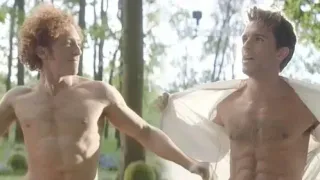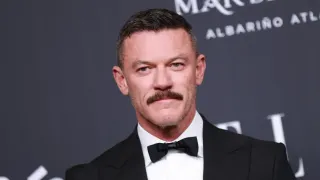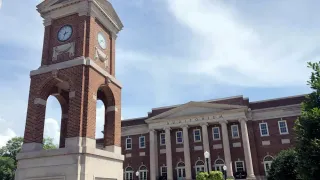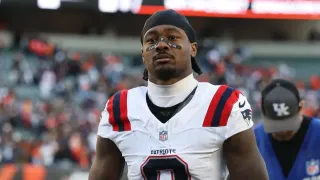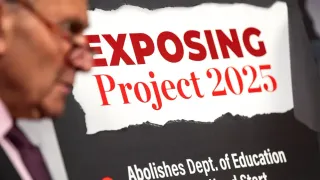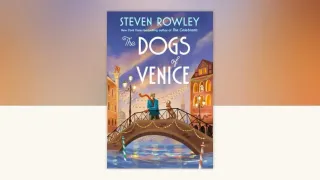October 25, 2021
Peripheral Visions: The World That Was
Kilian Melloy READ TIME: 16 MIN.
Peripheral Visions: They live in in terror's dark corners and move through the spaces between nightmares. But you won't see them coming... until it's too late.
The World that Was
"Sometimes, I could just give up," Will sighed.
Ray glanced over at his husband. "What do you mean?"
"I just mean, look at the state of the world."
"Maybe what you should give up is reading the New York Times first thing in the morning."
"But if I read it last thing before bedtime, I have nightmare," Will cracked. "Besides, I better enjoy it while I can. The police raids on the Times and other newspapers are getting more and more violent."
"If that's your idea of enjoyment," Ray said, turning his attention to the trail ahead. He stepped carefully. It was well-trod trail, but littered with rocks and roots.
"And that media liability law the Supreme Court is about to rule on... not to mention the way they canceled next year's elections..."
"Whatever happens, happens," Ray told him.
"What's gonna happen? Nothing," snorted Will. "That's the problem. We can't have change without elections. And we can't have justice without courts that are courts, and not kennels full of lapdogs."
"Hey," Ray said soothingly. "Let's try to be here in the moment."
"This is the moment," Will insisted. "After Georgia decided to ignore the will of the voters and give that self-centered moron another term..."
"Will," Ray sighed.
"You don't care about this? That lying sack is gonna have a third term, in total violation of our Constitution, and the courts he packed are letting him do it."
"The courts are under his direct control now," Ray pointed out, the subtext of his comment being a plea for Will not to start a whole new diatribe against Justice Conboy. The election's cancellation had, together with the court's most right-wing justice, become one conjoined monster for Will of late.
"Which only underscores what I'm saying," Will said. "There are supposed to be three branches of government. Checks and balances. And presidents, not kings."
"That crown he wore at the rally in Birmingham was pretty over the top," Ray admitted. "Even for him."
"His supporters sure loved it," Will said. Then he lapsed into a seething silence that was almost worse than his constant complaining.
The forest around them was thin in every sense of the word. The trees were sparse, skinny, and topped with a ragged corona of pale, yellowish leaves. It was July – a time for dark green leaves in frothy abundance – but the forest looked sickly.
It was sickly, of course. The whole world was sickly: The mountains, the prairies, the oceans and farmlands that used to feed the planet but now were depleted. The quick-growing trees were actually a source of hope, genetically engineered to pull carbon out of the atmosphere and maximize oxygen production. But they also had a frail look despite being designed to withstand the violent storms that had become commonplace. Ray supposed the point was for the trees to be supple and flexible. There weren't many trees of the old natural variety that could stand up to periods of drought, extreme heat, and frequent hurricane-force winds.
The leaves were pale in order to reflect sunlight, and not absorb it. That was part of the design, too. Still, couldn't the generic engineers have given their trees a thicker canopy? The pale blue sky, hazy and void of clouds, should have been peeking through the treetops. Instead, it was as though the treetops were an afterthought against the sky.
"The young people who are all gung-ho for the president just don't know what we used to have," Will said at length.
"They don't know any better," Ray agreed.
"That's how El Presidente and his merry cabal of thieves get away with their larceny," Will added. "That, and they've made a deal with the megachurches."
"The churches want power; he'll give it to them," Ray said. "It's the same deal he made the first time he got elected."
"Only time," Will interjected. "Everyone knows the second time he won, it was thanks to a stolen election, which Georgia was happy to help him pull off. And by cancelling next year's election, the court has just handed him another term on a big red pillow."
Ray sighed.
"Blood red," Will said bitterly.
"It's hardly a surprise, except for the believers who still think that churches aren't as corrupt as any other human institution," Ray said, not letting Will distract him from his thought.
"Because they don't believe churches are human institutions," Will said.
"That's the nature of faith," Ray said. He knew his words were only egging Will on, and he wished he could find some other way of signaling that he was open to conversation and supportive of his husband's feelings – some way that could also have soothed Will and allowed him to relax into what remained of the forest's natural beauty.
Ray was as angry and frightened as Will. He didn't, however, pine and grieve for the past the way Will did.
"Anyway," Ray said, "the good old days weren't all that good."
"Things are worse now," Will said. "Always worse."
Ray couldn't disagree with his husband on that score. The latest wave of laws and lockups had been aimed, like previous waves, at racial minorities, a response to the riots that had broken out in Georgia and several other states that had discarded the election results three years earlier. More riots had followed after the previous week's announcement that the 2028 elections were to be canceled, and all government officials were to be retained in their current offices indefinitely – except for those who were under investigation for ideological and religious sedition, that is. All of them Democrats, of course, plus a handful of moderate Republicans.
Ray smiled grimly as he thought about the reasons given for the canceled elections. The government blamed the riots, of course. And then they doubled down and pointed at the renewed unrest as evidence that canceling the elections had been the right thing to do.
Ray shook his head. The government's focus on "socialists" and people of color was already creeping toward a broader focus... a bigger tent, Ray reflected with a bitter smile. Now some religious leaders and members of congress were calling for investigations, arrests, and even summary executions for atheists and certain religious minorities. It was just a matter of time before the government came after Ray and Will, and anyone else who dared to be open about having a different sexuality. The noose had snapped democracy's neck, and it was still tightening.
Ray paused, feeling hot and agitated. Will, slightly ahead of him, looked back and also came to a stop.
"Would you get the water bottle out?" Ray asked, turning to present Will with the side pocket of his backpack.
Will pulled the water bottle out of the pocket, unscrewed the life, and handed it to Ray, who took a cooling drink. The day was already getting too hot for him, and the water was still cold. Ray offered the bottle to Will, who declined. Will didn't like cold water.
Ray contemplated another drink, looking at the bottle.
"How about that," Will said.
Ray looked up and saw Will staring at something to the side of the path. Following his husband's gaze, Ray saw a shimmering column of flying insects darting and swarming in a shaft of sunlight.
"I don't think I've seen that many flying insects in... well, probably twenty years," Will said.
"Probably longer," Ray said. "Almost all flying insects pretty much disappeared in the... what, the '90s? The aughts?"
"A long time ago." Will watched the insects. A smile – genuine, spontaneous – came over his face. He looked ahead. "I see more a little way off," he said, walking forward.
Ray followed, the water bottle still in his hand.
Ray was right: There were more flying insects. Gnats? Mosquitoes? Ray wondered if they were about to get bitten.
But the insects didn't attack. Instead, the swarms seemed to drift just beyond reach and remains in their own contained, frenzied universe.
Ray asked Will to put the bottle back in the backpack's side pocket. Will obliged. The two walked further along the path, catching sight of one swarm of insects after another where they hung in shafts of sunlight.
Shafts of sunlight...
Ray looked around, suddenly realizing that the tree canopy overhead was thicker and darker. For that matter, the canopy was higher up. Ray looked at the trees carefully: There were more of them, and they were closer together – a lot closer than they had been. The bark was darker, as were the leaves. The trunks were larger, too. These were the trees he'd seen in his youth, Ray thought, amazed that a stand of old growth trees remained.
Ray saw Will had ventured off the trail.
"Watch it," he called, surveying the ground cover which was also fuller and darker and more varied. "There might be ticks, or poison oak."
Will took no notice of the warning. "You smell that?" he asked.
Ray approached him, his ears now registering the sound of a small brook somewhere nearby. "The water?"
"Not just the water," Will said, staring down at something. As Ray drew closer, he saw that Will was standing over the brook. Ray hadn't realized it was so close. It wasn't much of a brook – maybe a foot across – but it seemed to run alongside the path from as far ahead as Ray could see.
Ray was about to ask Will what he was smelling when he saw something dark move through the water.
"What's in there?" Ray asked, bending forward slightly to see.
Will shot him a look, his smile having grown into a grin. "Tadpoles!" he said.
"What?" Ray leaned down closer to the water and saw that it was true. "Look at that," he said. "I wonder if the forest workers reintroduced them, or – ?"
"What workers?" Will snorted. "The ones who are supposed to prevent wildfires by raking the forest floor?"
Ray shrugged. "Where did they come from?"
Ray shook his head. "Maybe the reports about frogs being extinct were exaggerated?" he said.
Ray frowned, suspecting that Will was quoting from a movie. That was something his husband had always loved doing, years ago when they were young. Or even just a few years earlier – when it was still possible to watch just about any movie on the streaming services. Now only government-approved movies were available. Everything else was "spiritually contaminating," and off limits.
"Maybe it's the seed people," Ray said, thinking about the rumors that a secret cabal of preservationists were working in concert with the "deep state" to create and maintain caches of seeds, and even animal embryos, in hopes of one day bringing them back to the wild.
Not that there was much wild anymore. And not that such rumors had much chance of being true – not now that seed banks had been outlawed, and bounties offered to upstanding citizens willing to report anyone who broke the new laws.
And yet, here they were in a grove of trees that looked the way trees were supposed to look. And here were tadpoles, which suggested that frogs must be somewhere nearby. If not, then maybe there really were mythical preservationists at work.
But seed people couldn't have grown these trees, Ray realized. They were decades, maybe even centuries, old.
And the sky – what he could see of it through the leaves – was a dark blue, a deep and flawless blue...
A sky blue. Also something he hadn't seen in decades.
Ray started feeling uneasy. If they had stumbled onto some sort of illegal growing operation, then the people behind it might be of a mind to eliminate witnesses. He'd heard of such things – in his youth, on a trip to Hawaii, his friends had discussed venturing into remote areas in search of legendary marijuana fields that were supposedly tended by ruthless locals who would shoot trespassers. It was all talk, and they had spent the whole two weeks on beaches, but Ray wondered if those long-ago rumors were true, and if something like them held true now.
Ray wanted to turn and head back, but Will was already plunging ahead.
"Where are you going?" Ray called. "Will!"
Will kept on. Then he stopped and pointed. "You see those two trees? The tree that looks kind of uprooted, tilting across that other one?"
Ray saw what he meant. "The ones that look kind of like an 'X'?" he asked.
"I know those trees," Will said. "Or, I mean, I knew trees just like them. They were in the woods near my house when I was seven or eight and we lived in..." Will suddenly fell silent and started looking around carefully as though searching for something. More tadpoles?
"The air is different," he said.
"The sky is blue," Ray murmured.
"What?"
"The sky. If you look up, it's a shade of blue you don't see any more."
Will stared at him, then abruptly turned and raced off into the woods.
"Hey!" Ray started after his husband. "Will!" Was he nuts? He was going to trip and fall in this dense undergrowth. He was more than sixty years old, and though he had stayed healthy – they both had – a fall in the woods could be bad news.
Ray refused to run after Will. He followed the sound of his husband crashing through the forest growth and walked as quickly as he could and still feel safe. If Will got badly hurt, that would be enough of a disaster; a broken bone could bankrupt them. Ray wasn't going to compound any such situation.
When the thrashing noises of Will's progress suddenly ceased, Ray assumed the worst. But then he emerged into a clearing and saw his husband looking excitedly at another brook – a larger one than before, about a meter across. The brook wound across a wide-open field, carving itself into the landscape. There were bathtub-sized pockets at the brook's bends.
"I used to sit in those when I was a kid," Will said, pointing at one such deep pocket of water. "In the summer. They seemed so big then..." Will looked up. "And there's the treehouse."
Ray saw it: A rough structure made from gray wood, little more than a platform two meters up in the boughs of a tree next to the brook. Slats had been nailed into the tree's trunk to form a ladder. Will moved toward the crude ladder and Ray wondered if he was going to try to climb it, but he didn't; he simply touched a slat, a look of wonder and joy on his face.
"This is probably someone's private property," Ray said.
"Not it's not," Will told him. "I mean, of course it is, but... it's ours. It's our property."
"We don't own – "
"I don't mean me and you," Will said. "I mean my family. Mom and Dad."
Ray stared at him, wondering if Will had had a stroke. Will had grown up thousands of miles away, in Oregon.
Will had frozen in place, which only deepened Ray's fear. Then he repeated: "Mom and Dad." Again, he turned and bolted. Again, Ray followed.
Will ran – ran! At his age! – along the brook. The field led into a stand of trees – maybe an orchard? Dozens of trees spaced well apart grew in the field, green and lush, but Ray didn't see any fruit.
Up ahead, Will – still running, moving in a more agile way than Ray had seen in probably twenty years – approached a house. It was the sort of residence you didn't see any more: Two stories, painted white, with a tilted roof covered in brown shingles. A roof that let rain trickled down and off... rain and even snow. Their own house wasn't built like that; when rain came, it was in violent torrents, accompanied by winds that could reach speeds of well over a hundred miles per hour. Their house was a small one, set into a hillside and modified for maximal energy efficiency. They had built the place at the tail end of their prosperous years, in America's last brief window of democracy and reason.
The house looked well-maintained, and Ray wondered if it was inhabited. If so, it would be expensive to keep up; free standing and large as it was, it would waste energy and be vulnerable to hurricanes. Ray wondered how the house was still standing. He'd have assumed anything like it would have been demolished by now.
Ray saw Will reach the house and, without hesitating, go right through a side door.
"What the hell," Ray muttered. He wondered if Will was going to get them both killed.
But no sounds of alarm came from the house, and no gunfire. Maybe the house wasn't tenanted after all, Ray thought, as he drew closer.
When he reached the door, he heard voices inside. But he didn't hear Will's voice. One sounded like the metronomic drone of a television announcer, maybe a news anchor; Ray also heard two live voices, one a man and the other a woman.
Ray saw that the door Will had darted through was a screen door, which was why he could hear the TV and the people speaking within so clearly. There was a solid wooden door, too, that stood open, leading into a kitchen.
Ray heard the woman call, "Will? Are you getting yourself a snack?"
"No, Mom," a boy's voice answered her.
Will?
"You can go ahead and have some cookies," the woman called. "But not too many."
"Okay," the boy's voice replied.
Ray leaned into the screen door, trying to see deeper into the house. He saw the white fixtures of the kitchen: Sink, refrigerator. He saw cabinets, countertops a stove.
And he saw the boy. He was eight or nine years old, standing on the far side of the room near a doorway that led to some other part of the house, and he looked...
Ray swallowed. The boy looked like Will... not as he was now, but as he must have been in his childhood.
Ray and Will had been together since their 20s. Ray had watched his husband age and change for almost forty years. It wasn't hard to recognize him as a child.
"Will?" Ray whispered.
The boy looked at him gravely, and then shook his head and pressed a finger to his lips. The boy turned and walked silently through the doorway, into another room, disappearing from view. He'd gone into the living room, Ray supposed.
Ray listened closely, anxiously. The voice on the television changed to that of a woman saying something about "human garbage."
"They oughtta just round 'em all up and fuckin' shoot 'em," a man's voice said from the other room.
"Bradley, language," the woman said.
"Like he doesn't hear those words at school," the man said.
"I hope he doesn't!"
"On the playground I'm sure he does," the man said. "I did. But I wasn't such a sissy, so maybe he plays with the little girls. And I don't mean doctor. I wish he would, it might do him good."
"Bradley!" the woman said, sounding scandalized. "Our son would never!"
"Yeah, that's the problem," the man retorted. "If I don't take him out hunting and shooting he's gonna end up just like the faggots Anita's talking about on the TV."
Ray felt sick. They were watching an old news clip of Anita Bryant, who had recently become famous all over again. She was the subject of a string of documentaries on government-approved TV channels. She was supposedly going to replace Harriet Tubman on the twenty-dollar bill. There was even talk of issuing a stamp in Bryant's honor, though the beleaguered post office seemed likely to be shut down before long.
"Brad, please don't talk about our son like that," the woman said. "He's a good boy, he's not... he's not that sort of filth."
"If he's not, it's a miracle from God!" the man suddenly yelled. "The way you baby him, any boy would turn fruity. I better take him out shooting this afternoon."
"Brad, you've been drinking so much this morning, it's not safe to go shooting," the woman began.
"See? That's just exactly how you turn a decent boy into a goddamn faggot!" the man's voice replied angrily, a little slurred. A little drunk, Ray thought.
Ray found it shocking to hear Will's parents speaking that way. Then he stopped himself: This couldn't be Will's childhood home, and that boy couldn't be Will. That would mean that...
No. Such things weren't possible.
But where was Will, then?
The man's voice was growing louder as he continued his homophobic diatribe, hurling horrible slanders and curses at the woman and making twisted accusations about the boy. Ray, shocked by what he was hearing, wondered where anyone halfway sane, or halfway decent, could come up with the nauseating filth the man was loudly describing.
Then Ray thought about the things the president's so-called religious advisors had been saying about gays on the news programs. He remembered the things supposedly Christian preachers had claimed gays said, thought, wanted, and did. The loud drunk in the living room, he realized, was simply spouting the absurdities that had been poured into his ears by influential people.
How similar were the people in this house to Will's own parents? Ray refused to believe that these really were Will's father and mother, called up from the past like ghosts, but he didn't doubt that they were very much like them, given the way Will's father had disowned him and cut ties when Will came out. Will's father, very much an old-school patriarch, had forbidden his mother and sister to have any contact with him, either. Ray had never even met Will's parents; they were both dead now, but he'd seen the deep scars and lasting harm they'd caused their son.
As Ray watched, the boy wandered back into the kitchen, his eyes wet. The boy stood in the middle of the kitchen for a long moment.
The TV voice droned on, a torrent of words, with a few phrases popping out – "homosexual lifestyle," "electroshock treatment," "recruiting children." All the usual slanders and lies.
Ray stepped away from the door, uncertain what to do. He started to walk back toward the field, suddenly wanting to put distance between himself and the house. He felt himself fighting against the growing conviction that he'd somehow just witnessed something from Will's past. But how? No, Ray told himself, that boy in there could not be his husband, as much as he looked like a juvenile version of Will. Actually, had the boy really looked that much like Will? Maybe Ray was remembering the boy not as he'd actually looked, but as he'd imagined him to look, as he drew sympathetic parallels between the boy and his husband. But again... if that boy wasn't Will, then where had Will gotten to? He was inside that house somewhere. What was he doing? Hiding in a bedroom? And why?
Ray heard the creak of the kitchen's screen door. He turned to see Will emerging from the house. He was the same old Will... literally; he was once again a gray-haired man of sixty-two years.
Ray stared at Will, then gestured for them to go.
They walked away from the house, careful not to be visible to its occupants through the living room windows. They walked back through the orchard and along the brook, then made their way through the forest growth. Will took the lead, glancing once again at the two trees that formed a crude "X." Finally, they were on the trail again, and Will started back the way they'd come.
Ray hastened to catch up to him.
"What was that?" he asked.
"I really don't know," Will told him.
"Did we just... did you..."
"I, I don't know," Will said, and then took Ray's hand.
It was dangerous, in these days, for a same-sex couple to be seen holding hands in public. It was a good way to get beaten, even killed. Oh, and robbed, too, of course – as though robbery wasn't a main motive for such violence all along, as if the excuse of a person's otherness was anything more than a convenient justification. Anti-gay murders and other violent bias crimes were rising again, and it was only going to get worse. There was talk of a Russia-style "no homo promo" law that would make any discussion of so-called "alternative lifestyles" in public places, and any demonstration of same-sex affection, a crime... a crime with stiffer penalties, Ray reflected, than, say, beating people up just because of who they were.
But Ray, usually so cautious, didn't care who might come up the path and see them. Not right now. Not after what had just happened.
Or had it happened?
Ray looked around and saw that the forest was exactly as it should be: Slender, pale trees sporting sparse, lime-yellow leaves.
He sighed. "I'm sorry," he told Will, though he only half-knew why he was saying it.
Will shook his head. "Doesn't matter," he said.
"Of course it does," Ray said.
Will gave him a sidelong smile. "You might be right," he said. "That wonderful past I longed for might not have been so wonderful after all. And if the future looks rough, maybe it's no worse, really, than how it was before."
"Before... now?" Ray asked.
"Before that moment of hope we were lucky enough to see. Really lucky. More so than the men and women who lived through centuries of..."
Ray nodded. Centuries of that – what he had just heard oozing from the house. The house of Will's youth, or something very much like it.
They walked along the path together. Ray thought again about who they might meet. Thought about pulling away, but then decided to hold Will's hand just a little longer.
